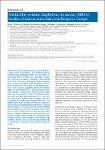Methicillin-resistant Staphylococcus aureus (MRSA): burden of disease and control challenges in Europe
Köck, Robin
Becker, Karsten
Cookson, B.
Gemert-Pijnen, J. E. van
Harbarth, S.
Kluytmans, J.
Mielke, Martin
Peters, G.
Skov, R. L.
Struelens, M. J.
Tacconelli, E.
Torné, A. Navarro
Witte, Wolfgang
Friedrich, Alexander W.
Methicillin-resistant Staphylococcus aureus (MRSA) is a major cause of healthcare- and community-associated infections worldwide. Within the healthcare setting alone, MRSA infections are estimated to affect more than 150,000 patients annually in the European Union (EU), resulting in attributable extra in-hospital costs of EUR 380 million for EU healthcare systems. Pan-European surveillance data on bloodstream infections show marked variability among EU Member States in the proportion of S. aureus that are methicillin-resistant, ranging from less than 1% to more than 50%. In the past five years, the MRSA bacteraemia rates have decreased significantly in 10 EU countries with higher endemic rates of MRSA infections. In addition to healthcare-associated infections, new MRSA strains have recently emerged as community- and livestock-associated human pathogens in most EU Member States. The prevention and control of MRSA have therefore been identified as public health priorities in the EU. In this review, we describe the current burden of MRSA infections in healthcare and community settings across Europe and outline the main threats caused by recent changes in the epidemiology of MRSA. Thereby, we aim at identifying unmet needs of surveillance, prevention and control of MRSA in Europe.
No license information
Related Items
Show related Items with similar Title, Author, Creator or Subject.
-
2005-12-22ZeitschriftenartikelA syringe exchange programme in prison as prevention strategy against HIV infection and hepatitis B and C in Berlin, Germany Stark, Klaus; Herrmann, U.; Ehrhardt, S.; Bienzle, UlrichIn two prisons in Berlin, Germany, provision of sterile injection equipment for injecting drug users (IDUs) started in 1998. To assess the programme's impact, the frequency of injecting drug use and syringe sharing, and ...
-
2009-01-01ZeitschriftenartikelSelection Tool for Foodborne Norovirus Outbreaks Verhoef, Linda; Kroneman, Annelies; Duynhoven, Yvonne van; Boshuizen, Hendriek; Pelt, Wilfrid van; Koopmans, Marion; Koch, Judith; Schreier, Eckart; Stark, KlausDetection of pathogens in the food chain is limited mainly to bacteria, and the globalization of the food industry enables international viral foodborne outbreaks to occur. Outbreaks from 2002 through 2006 recorded in a ...
-
2014-04-10ZeitschriftenartikelResults of surveillance for infections with Shiga toxinproducing Escherichia coli (STEC) of serotype O104:H4 after the large outbreak in Germany, July to December 2011 Frank, Christina; Milde-Busch, Astrid; Werber, DirkAfter the massive outbreak of infections with Shiga toxin-producing Escherichia coli (STEC) of serotype O104:H4 in Germany in the summer of 2011, post-outbreak surveillance for further infections with this type of STEC was ...

